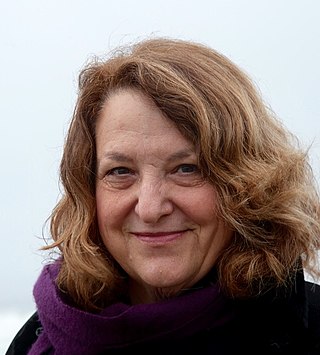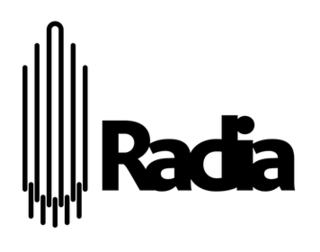Related Research Articles
Patti Schmidt is a Canadian radio personality, curator, creative producer, musician and DJ from Montreal, Quebec. She is best known for her tenure as host and executive producer of CBC Radio 2's long-running alternative music program Brave New Waves from 1995 to 2007.

Lynn Hershman Leeson is an American multimedia artist and filmmaker. Her work with technology and in media-based practices is credited with helping to legitimize digital art forms. Her interests include feminism, race, surveillance, and artificial intelligence and identity theft through algorithms and data tracking.

Started in April 2005, the Radia network is an international informal network of community radio stations that have a common interest in producing and sharing art works for the radio. In 2024, the network gathers 22 radio stations from 21 cities across 15 countries, speaking 9 different languages. It also organizes linked-up events and special broadcasts. Radia intends to be a space of reflection about today's radio and radio art. Its activities try to contribute to intercultural exchange and artworks' and artists' circulation.

Internet art is a form of new media art distributed via the Internet. This form of art circumvents the traditional dominance of the physical gallery and museum system. In many cases, the viewer is drawn into some kind of interaction with the work of art. Artists working in this manner are sometimes referred to as net artists.
La Centrale galerie Powerhouse is an artist-run space in Montreal, Quebec, Canada, founded in 1973. For decades, it was known as the city's only feminist art gallery.
Imago Theatre is a professional feminist theatre company based in Tiohtià:ke/Montreal, Quebec, Canada. The company was founded in 1987 by Andres Hausmann, Ray Tomalty, and Kelly Patterson, and is now led by the current Artistic and Executive Director, Krista Jackson. Imago Theatre is a catalyst for conversation, an advocate for gender inclusion and a space that centres feminist values and artistic practices. Imago's ethos is that by holding space for gender-inclusivity and giving power to women and gender-diverse people, art can create a more inclusive, safe, compassionate world.

New media art includes artworks designed and produced by means of electronic media technologies. It comprises virtual art, computer graphics, computer animation, digital art, interactive art, sound art, Internet art, video games, robotics, 3D printing, immersive installation and cyborg art. The term defines itself by the thereby created artwork, which differentiates itself from that deriving from conventional visual arts such as architecture, painting or sculpture.
Anna Friz is a Canadian artist and musician whose work often pertains to, and utilizes the medium of, sound and radio. Starting in 1993, Friz has been involved with campus-community radio stations across Canada, and also works as a sound designer for film and stage performance. She has contributed original programming to numerous Canadian campus-community stations such as CITR-FM, CKUT-FM and CKUW, as well as for the CBC and Kunstradio, Austria.

Kim Sawchuk is a professor in the Department of Communication Studies, Research Chair in Mobile Media Studies, and Associate Dean of Research and Graduate Studies at Concordia University in Montreal Canada. A feminist media studies scholar, Sawchuk's research spans the fields of art, gender, and culture, examining the intersection of technology into peoples lives and how that changes as one ages.
Afrophilya is an international music festival founded in Montreal, Quebec, Canada. The festival was launched in February 2011 at Le piano rouge soul lounge to coincide with the celebration of Black History Month. Afrophilya is a contemporary view of Afro Culture and celebrates the artistic contributions of people of African descent to world culture. Notable artists who have performed at the festival include; international contemporary jazz stars José James, Kris Bowers, South African Lorraine Klaasen daughter of Nelson Mandela's favourite singer Thandi Klaasen, Dessy Di Lauro - Delirium and Ric'key Pageot, G'nee, Sarah MK, Warren "Slim" Williams, 2005 Maple Blues Awards winner Dawn Tyler Watson, Henri-Pierre Noël, and many more.

Coral Short is a queer Canadian multimedia artist and curator. Based in Berlin and Montreal, they are best known for their performance art, as a curator of short film programs, and as a creator of affordable queer artist residencies.
Skawennati is a First Nations (Kahnawakeronon) multimedia artist, best known for her online works as well as Machinima that explore contemporary Indigenous cultures, and what Indigenous life might look like in futures inspired by science fiction. She served as the 2019 Indigenous Knowledge Holder at McGill University. In 2011, she was awarded an Eiteljorg Contemporary Art Fellowship which recognized her as one of "the best and most relevant native artists."
Nell Tenhaaf is a Canadian artist, teacher, writer and feminist.
Carmen Coulombe was a Canadian artist.
Julie Tremble is a French-Canadian artist living in Montreal, Quebec. She has held coordinating positions in a variety of cultural organisations in Quebec and Ontario. Since 2015, she has headed Vidéographe, the Montreal-based artist-run centre focused on moving images.
Faces is an international online community of women who share an interest in digital media arts. They communicate via an email list and organize events both online and off. Founded in 1997, this informal network includes activists, artists, critics, theoreticians, technicians, journalists, researchers, programmers, networkers, web designers, and educators.
Barbara Steinman is a Canadian artist known for her work in video and installation art.
Fortner Anderson is an American-born poet, performance artist, and visual artist who has lived in Montreal, Quebec, since 1976. He is the author of several volumes of poetry and has published many audio recordings of his spoken word performances, and is known for innovative use of technology to present poetry readings.
Chun Hua Catherine Dong (she/they) is a Chinese-born Canadian multimedia artist. Dong’s artistic practice is based in performance art, photography, video, installation, virtuality (VR), augmented reality (AR), and 3D printing within the contemporary context of global feminism.
Sonia Paço-Rocchia /so.ˈnja ˈpa.so ˈrɔ.kja/, born in 1982 in Montreal, is a composer, multidisciplinary artist, improviser, bassoonist and creative coder.
References
- 1 2 "Studio XX, centre d'artistes féministes". www.esmtl.ca (in Canadian French). Retrieved 2021-02-23.
- 1 2 Abtan, Freida (2016). "Where Is She? Finding the Women in Electronic Music Culture". Contemporary Music Review. 35: 53–60. doi:10.1080/07494467.2016.1176764. S2CID 147062994 – via Taylor & Francis Online.
- 1 2 3 Moore, Sheehan. The XX Factor. The McGill Daily, Volume 99, Issue 36. Retrieved 2021-16-02
- 1 2 "Feminism, Media Technologies, and Studio XX: An Interview with Kim Sawchuk". NMC Media-N. 2013-05-08. Retrieved 2021-02-23.
- 1 2 3 Parent, Sylvie (2008). "" Un studio à soi " : entrevue avec Bérengère Marin Dubuard, du Studio XX" (PDF). Revue de l'Art Actuel ETC. 84: 29–31.
- 1 2 3 "Le Studio XX devient Ada X". Réseau Art Actuel. 2020-08-26. Retrieved 2021-02-17.
- 1 2 "A new name for Studio XX?". Conseil québécois des arts médiatiques. 2019-10-29. Retrieved 2021-02-16.
- 1 2 3 4 5 "ffiles | CKUT 90.3 FM". www.ckut.ca. Retrieved 2021-02-19.
- 1 2 "Ada X". Réseau Art Actuel. Retrieved 2021-02-23.
- 1 2 "Themes". Studio XX. Retrieved 2021-02-18.
- 1 2 "Studio XX". www.transartists.org. Retrieved 2021-02-18.
- ↑ "Les arts électroniques en famille avec Studio XX". La médiation culturelle à la Ville de Montréal (in French). 2016-04-28. Retrieved 2021-02-18.
- ↑ "Studio XX". Canada Council for the Arts. Retrieved 2021-02-23.
- ↑ "Festival HTMlles / Studio XX". Réseau Art Actuel. 2019-11-27. Retrieved 2021-02-23.
- ↑ "The HTMlles 11 – Feminist festival of media arts + digital culture – Palyazatok.org" . Retrieved 2021-02-18.
- ↑ "About – HTMlles Festival". htmlles.net. Retrieved 2021-02-18.
- ↑ "Ada X présente : Festival HTMlles". Réseau Art Actuel. Retrieved 2021-02-18.
- ↑ "HTMlles Festival". Studio XX. 2015-11-09. Retrieved 2021-02-18.
- ↑ "HTMlles Festival – save the date!". Studio XX. 2020-10-10. Retrieved 2021-02-18.
- ↑ "HTMlles Festival | Edition 13". Studio XX. 2018-09-26. Retrieved 2021-02-18.
- ↑ "Terms of Privacy | HTMLLES". HTMLLES 2016. Retrieved 2021-02-18.
- ↑ "FESTIVAL HTMLLES 2014". htmlles.net. Retrieved 2021-02-18.
- ↑ XX, Studio (2012-02-15). "HTMlles Festival 10 - 2012". htmlles.net (in French). Retrieved 2021-02-18.
- ↑ "HTMlles 9 - 2010 :: Home Land". Studio XX. 2010-11-13. Retrieved 2021-02-18.
- ↑ "HTMlles 8 - 2007 :: crowd control". Studio XX. 2007-10-17. Retrieved 2021-02-18.
- ↑ "HTMlles 7 - 2005 :: peripheries + proximities". Studio XX. 2005-05-18. Retrieved 2021-02-18.
- ↑ "HTMlles 6 - 2003 :: Active Agent". Studio XX. 2003-02-04. Retrieved 2021-02-18.
- ↑ "HTMlles 5 – 2002 :: The double, the multiple and contamination in Web Art". Studio XX. 2002-02-06. Retrieved 2021-02-18.
- ↑ "HTMlles Maid in Cyberspace 4 – 2001 :: Mutating Cultures and Identities". Studio XX. 2001-02-07. Retrieved 2021-02-18.
- ↑ "XX Files". popmontreal.com. Retrieved 2021-02-23.
- ↑ "CKUT 90.3 FM | CKUT 90.3 FM". www.ckut.ca. Retrieved 2021-02-19.
- ↑ "Lancement de Matricules, le samedi 20 septembre à 17 h à La Chambre Blanche". Réseau Art Actuel. 2018-08-09. Retrieved 2021-02-19.
- ↑ "Matricules". Studio XX. Retrieved 2021-02-19.
- ↑ "Mission and History | .dpi". dpi.studioxx.org. Retrieved 2021-03-22.
- ↑ ".dpi". Arts & Médias.
- 1 2 3 Levine, Rachel (2013-04-25). ".dpi reboots feminist digital art". Cult MTL. Retrieved 2021-03-22.